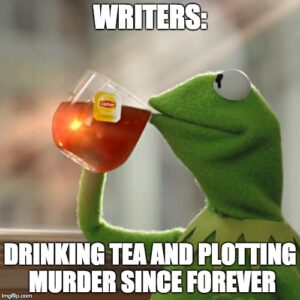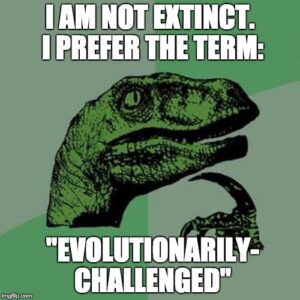It’s Squatter’s Rights Wednesday! Though, at this point, it’s more of a sublet than anything. I was planning on writing something snarky and funny today, but I woke up with the first sentence of this blog screaming in my head. Clearly, someone forgot to give my muse her decaf.
Naturally, though, we begin with the obligatory Denny Basenji picture.

Dear Leader is pensive this morning.
Please don’t worry that I am about to abandon the magnificent and wonderful tradition of this blog in staying the f*ck away from politics, etc. However, I found that the recent ugliness that claimed the life of an innocent woman raised a truly poignant, pertinent question for writers:
How do we as writers properly use ugly things?
Sure, a lot of us stay away from these topics or avoid writing in the genres that might land us in cultural minefields. But, we all reach a moment when our fingers pause over the keyboard as we wonder if we really should use that word, or describe a character with a particular label, or hint at a certain belief. It’s universal and unavoidable, really. Because when we are telling stories that mean something to us, that meaning is by nature complex and reflective of the entire spectrum from white to grey to black.
What are your intentions toward my novel, young man?
Writers are sneaky. We like to explore our vulnerabilities, controversial or dark thoughts, and unpopular opinions using the cloak-and-dagger of “plot” and “characters” and especially “the antagonist.”
This is absolutely the right thing to do. Our ability to slip in and out of disguise, to inhabit other lives and other worlds, is the Promethean gift to writers. Actors are similar to us, except they do it in a way that is physical and immediate. Whereas, we writers sip our tea, smile a little, and ponder if gutting the host with a cheese knife would leave enough forensic evidence for the pathologist to know that we were served camembert instead of brie.

This is all well and good.
Things become sticky when we fail to be honest with ourselves about our motivations. The ability to “shape shift” into our fiction comes with an equal measure of responsibility. We need to look at what we are saying and why we are saying it. Not just the general theme or message. We have to ask the hard questions of ourselves:
- How did we get to this point in our lives where we need to write about this theme?
- Could my message be seen from a different viewpoint? Can I accept that? Why or why not?
- What does this message say about me as a person and what I believe and value?
- Am I doing this to work off a grudge? Against whom or what? Why or why not?
- Am I doing this so I can say things I am not normally allowed to say in society? Why or why not?
Notice that little phrase I keep using? “Why or why not?”
We can’t just stop at the first level of answers we give ourselves. If we are going to be authentic, honest, and meaningful, we must push ourselves to look unflinchingly at the truth – good, bad, ugly, and bad hair day – of who we truly are.
It is only when we are truthful about our own motivations that we can be meaningful…and careful when we handle ugly things.
You have the right to remain silent.
Writing difficult, ugly, and controversial things is a privilege, not a right. I mean, technically, yes, we have the First Amendment on our side. But, the moment we write something carelessly or thoughtlessly, we forfeit our alibi with our readers…and ourselves.
This is not about political correctness, identity politics, or anything like that. Those are incendiary labels that get shot back and forth in society like flaming tennis balls at the Wimbledon from hell.
This is about being honest with ourselves and doing the work to think through not just why we are writing something, but also tapping into our empathy to see if we are carelessly or thoughtlessly saying something that is needlessly hurtful to others.
That’s not to say that as writers, we can’t use stereotypes, prejudices, etc. We absolutely can – and often should. The difference is in our motivation and the care with which we do so.
Please note the second half of that sentence: the care with which we do so.
Because if the road to hell is paved with good intentions, thoughtful writing craft is the GPS of salvation.
Handling ugly things requires the care and skill of a Ming dynasty vase collection curator. When we we use an ugly thing, we need to slow down, maybe even come to a full stop. This is a moment for analyzing what we are about to say, why we are saying it, which character/POV is saying it, why we chose that character/POV, what are that character’s motives and beliefs, and is this truly necessary to the story at that moment?
Ugly things are powerful. Ugly things evoke a visceral reaction in a reader that few other aspects of fiction can do. Ugly things can bring up ugly memories, traumas, deep fears, blistering rage, and gut-wrenching sorrow. Ugly things can turn the reader’s world upside down or make them face a world they had been hiding from.

This would be a moment to insert that old chestnut about absolute power corrupting absolutely. Sure, we as writers may not be making the kind of bank that a hedge fund manager or anesthesiologist makes, but we have the ability to haunt someone’s waking moments for weeks – if not months – after reading our words. That, my friends, is absolute power.
If we cannot or are unwilling to do the work to use our power responsibly and respectfully, then perhaps we should remain silent…
Speech therapy.
I have been toying with the idea of offering a class on this subject. I’d want it to be something where we really get into the weeds of how/when/not to use specific words, stereotypes, etc. However, it’s all too easy for a class like that to degenerate into a session of everyone complaining about the wrongs done to them as a person or as a writer. I include myself in this worry because this topic is a slippery slope. No, wait, it’s a glass slope covered in ice, with a layer of oil poured on top, and paved with banana skins for good measure.
Still, I think it might be something worth trying out. If you’d like to be part of this experiment, leave a comment and let me know!
***
For the month of AUGUST, for everyone who leaves a comment, I will put your name in a hat. If you comment and link back to my blog on your blog, you get your name in the hat twice. What do you win? The unvarnished truth from yours truly.
I will pick a winner once a month and it will be a critique of the first 20 pages of your novel, or your query letter, or your synopsis (5 pages or less).
***
CATCH THE LAST CLASSES FOR AUGUST AND WATCH HERE FOR OUR WHOLE NEW LINE-UP OF SEPTEMBER CLASSES!
All classes come with a FREE recording!
We’ve added in classes on erotica/high heat romance, fantasy, how to write strong female characters and MORE! Classes with me, with USA Today Best-Selling Author Cait Reynolds and award-winning author and journalist Lisa-Hall Wilson. So click on a tile and sign up!
[abcf-grid-gallery-custom-links id=”22231″]








12 comments
3 pings
Skip to comment form
In my mind I’m a stage actor not a writer. I write my dialogue. Brief comment cued by thoughtful words like yours or triggers, all kinds of triggers. I lack the intellectual heft for composing good paragraphs never mind essays but I’m reconciled to my limitations not least because acting immerses me in the exploration of our human condition in a way that completes a process for me. I read as if I am the writer’s voice, feel everything I can that the writer and the characters feel. that is that can perceive and identify with. Actors are sponges, empathetic or nothing. I realize this is half baked talk and dodges the horror of the day while kinda circling it. Words are hard enough to understand and barely convey the universe of feelings behind them. Thanks for letting me talk here. and thanks for your essay. Bill
Hi William. I don’t know if I’m permitted to comment on a ‘reply post’. I just wrote a reply to this Blog Post as well. Like to comment that I enjoyed reading the style in which you express yourself on this topic. Take care.
Thank you Mary!
It is so important how we use words. Language is the superpower of all people! Thanks for this article.
Morning Cait. Your handsome boy looks good! While there are many gem takeaways from your Blog entry, this is my favorite: “Sure, we as writers may not be making the kind of bank that a hedge fund manager or anesthesiologist makes, but we have the ability to haunt someone’s waking moments for weeks – if not months – after reading our words. That, my friends, is absolute power.” Yes, the topic that you are considering is necessary. I will sign up for it. Take care.
Yes!! Do that class!!! :o)
Great post, Cait. And it’s wonderful that you’ve given us a way to apply the communication aspects, the words, the mangling of messages in a productive way to our writing.
Just watched the memorial service for Heather — if you get a chance to hear what her mother said, take the time…it was very empowering.
Thank you for this. It’s an important topic that needs to be considered carefully in every genre. I often forget the kind of power I wield when I write. And as always, I appreciated your writing style. A little levity always helps when dealing with a serious topic.
I would be interested in attending this class. I am editing a novel that deals with a dark subject. Should you decide to do so, I would be interested in taking it.
What a smart, sensitive post. Worth keeping in mind not just for our own writing, but when critiquing peers.
Super cute puppy, and he knows he is. 🙂
Interesting post, especially in light of current events. I know I personally try to avoid controversy. Writing is an escape, especially romance novels, which is what I both read and write.
Yet, romance is also a way to take on difficult matters. Like divorce and second chance love. Once, those were risky or taboo topics, but authors dealt with them. Concepts of women being able to enjoy sex were also once considered risky, whereas we now take them for granted.
Consent is always a huge issue for me in any book I read or write. Perhaps a subconscious response to rape culture.
I’m not really sure where I stand on the spectrum, but it has given me something to think about.
I definitely think it would be something worth doing. Thanks for the great post.
I loved this post, and agree wholeheartedly. There are some great quotable quotes in here, too. I’m so glad you didn’t go “snarky” on this one–it deserves the respect you gave it, just like those tough topics do.
Stories change the world. That’s something I remember every time I sit down at my keyboard.
[…] Read the rest of this post HERE. […]
[…] Good dialogue makes characters and stories come alive. Jordan Dane presents 10 ways to make dialogue real, James Scott Bell explores how to have your characters talk tough, and Cait Reynolds discusses using controversial language and stereotypes in fiction. […]
[…] Posted by mcm0704 on August 25, 2017 | ∞ Today’s blog post is going to truly be a mix of odds and ends. I am still busy cleaning up my house to list it for sale, and the task has been daunting, especially my office. A friend once said that a cluttered desk is a sign of a creative mind, and I take that very seriously. First off, I have a sample of a recent blog post by Kristen Lamb. She covers all aspects of the writing game, from words on paper to marketing, and in this post she considers Saying What You Mean. […]